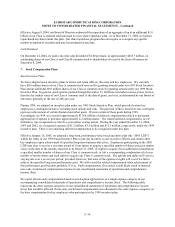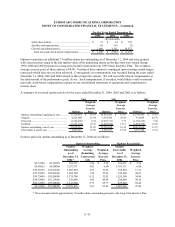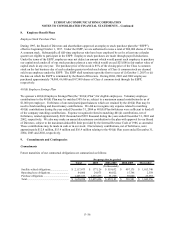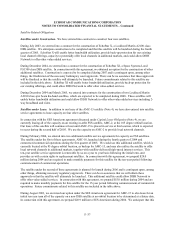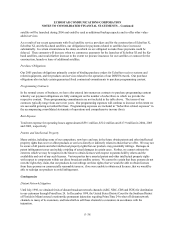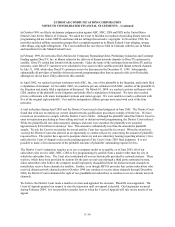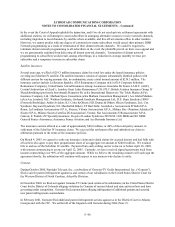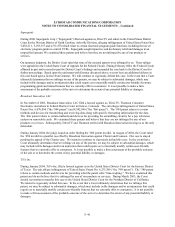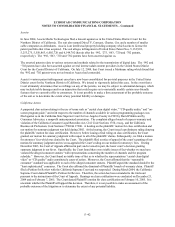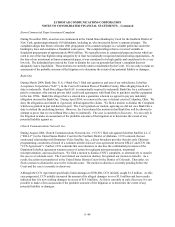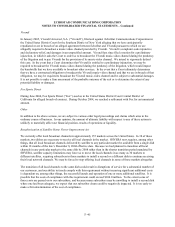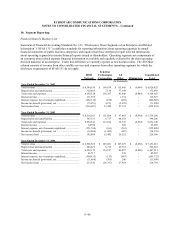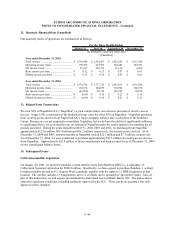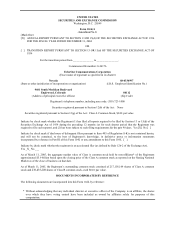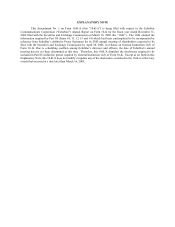Dish Network 2004 Annual Report Download - page 122
Download and view the complete annual report
Please find page 122 of the 2004 Dish Network annual report below. You can navigate through the pages in the report by either clicking on the pages listed below, or by using the keyword search tool below to find specific information within the annual report.ECHOSTAR COMMUNICATIONS CORPORATION
NOTES TO CONSOLIDATED FINANCIAL STATEMENTS – Continued
Acacia
In June 2004, Acacia Media Technologies filed a lawsuit against us in the United States District Court for the
Northern District of California. The suit also named DirecTV, Comcast, Charter, Cox and a number of smaller
cable companies as defendants. Acacia is an intellectual property holding company which seeks to license the
patent portfolio that it has acquired. The suit alleges infringement of United States Patent Nos. 5,132,992,
5,253,275, 5,550,863, 6,002,720 and 6,144,702 (herein after the ‘992, ‘275, ‘863, ‘720 and ‘702 patents,
respectively). The ‘992, ‘863, ‘720 and ‘702 patents have been asserted against us.
The asserted patents relate to various systems and methods related to the transmission of digital data. The ‘992 and
‘702 patents have also been asserted against several internet adult content providers in the United States District
Court for the Central District of California. On July 12, 2004, that Court issued a Markman ruling which found that
the ‘992 and ‘702 patents were not as broad as Acacia had contended.
Acacia’s various patent infringement cases have now been consolidated for pre-trial purposes in the United States
District court for the Northern District of California. We intend to vigorously defend this case. In the event that a
Court ultimately determines that we infringe on any of the patents, we may be subject to substantial damages, which
may include treble damages and/or an injunction that could require us to materially modify certain user-friendly
features that we currently offer to consumers. It is not possible to make a firm assessment of the probable outcome
of the suit or to determine the extent of any potential liability or damages.
California Action
A purported class action relating to the use of terms such as “crystal clear digital video,” “CD-quality audio,” and “on-
screen program guide,” and with respect to the number of channels available in various programming packages was
filed against us in the California State Superior Court for Los Angeles County in 1999 by David Pritikin and by
Consumer Advocates, a nonprofit unincorporated association. The complaint alleges breach of express warranty and
violation of the California Consumer Legal Remedies Act, Civil Code Sections 1750, et seq., and the California
Business & Professions Code Sections 17500 & 17200. A hearing on the plaintiffs’ motion for class certification and
our motion for summary judgment was held during 2002. At the hearing, the Court issued a preliminary ruling denying
the plaintiffs’ motion for class certification. However, before issuing a final ruling on class certification, the Court
granted our motion for summary judgment with respect to all of the plaintiffs’ claims. Subsequently, we filed a motion
for attorneys’ fees which was denied by the Court. The plaintiffs filed a notice of appeal of the court’s granting of our
motion for summary judgment and we cross-appealed the Court’s ruling on our motion for attorneys’ fees. During
December 2003, the Court of Appeals affirmed in part; and reversed in part, the lower court’s decision granting
summary judgment in our favor. Specifically, the Court found there were triable issues of fact whether we may have
violated the alleged consumer statutes “with representations concerning the number of channels and the program
schedule.” However, the Court found no triable issue of fact as to whether the representations “crystal clear digital
video” or “CD quality” audio constituted a cause of action. Moreover, the Court affirmed that the “reasonable
consumer” standard was applicable to each of the alleged consumer statutes. Plaintiff argued the standard should be the
“least sophisticated” consumer. The Court also affirmed the dismissal of Plaintiffs’ breach of warranty claim. Plaintiff
filed a Petition for Review with the California Supreme Court and we responded. During March 2004, the California
Supreme Court denied Plaintiff’s Petition for Review. Therefore, the action has been remanded to the trial court
pursuant to the instructions of the Court of Appeals. Hearings on class certification were conducted on December 21,
2004 and on February 7, 2005. The Court denied Plaintiff’s motion for class certification on February 10, 2005. It is
uncertain whether the Plaintiff will appeal this decision. Therefore, it is not possible to make an assessment of the
probable outcome of the litigation or to determine the extent of any potential liability.
F–42




